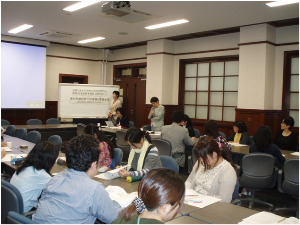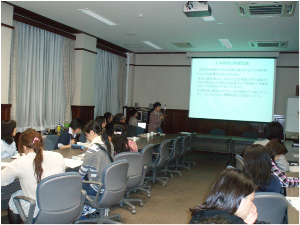Recently, the transition process from school to work has become even more challenging. So what kind of support will be possible for the career development of youths as part of their school education? Up to now, discussions on the transition from school to work have emphasized the placement service mechanism of schools. In this seminar, our agenda was to consider the transition problem focusing on the effects of a school education on a youth’s career development.
Ms. Wang reported on the efforts by higher education providers to offer career guidance to students in China, where the labor market and placement mechanisms have changed greatly because of recent drastic social changes. Ms. Terasaki presented information on junior high school students’ activities of learning through work experience in Japan, where youth employment has continued to encounter social problems, starting with the recession in the 90's. Then Mr. Kameyama speculated on the abilities that youths need from the aspect of inclusive career development support by schools, by enterprise, and by society.(26. Jan. 2009)
The Global COE Program at Ochanomizu University (Educational/Social Inequality Research Group) held a public seminar on the Japan Education Longitudinal Study (JELS). JELS is the first full-scale longitudinal study in Japan, which covers childhood to adulthood.
Mr. Otawa's presentation took a general view of the high school student culture of recent years. Ms. Hori’s presentation aimed to analyze the present high school transition system. An active question and answer session followed, and we engaged in a fulfilling discussion. (19. Jan. 2009)
On 21 Dec. 2008, the Global COE Program held an open seminar on social exclusion and social inclusion as the second seminar of the Disciplinary Linkage Project.
Social exclusion/inclusion is a key concept that has developed in recent years, especially in Europe, in political and social discussions about inequality, poverty, and discrimination. In Japan, the concept is beginning to be an important framework to analyze social gaps, poverty, and unemployment.
The speakers presented a theoretical framework of the concept of social exclusion/inclusion, the development of the social policy of “active inclusion,” especially in France, and a case of actual inclusion of the homeless in Osaka city. 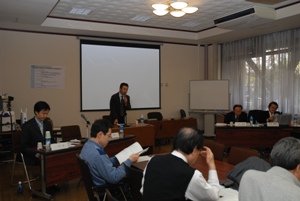
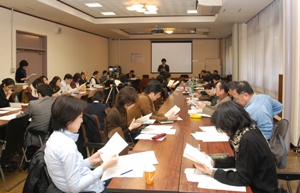
From December 15 to 22, 2008, the Ochanomizu University Global COE Program "Science of Human Development for Restructuring the Gap-Widening Society”hosted a seminar on Early Childhood Education in Japan and Korea. The seminar welcomed Prof. Lee Ki Sook of Ewha Womans University, one of Korea’s top experts in the field of early childhood education, along with 18 students.
This international training seminar lasted for eight days, and featured interpreting in Japanese and Korean. There were tours of six daycare centers and kindergartens, including Wakoh Daycare, which emphasizes the development of human character through education in natural surroundings; Tampopo Daycare at Tokyo University, which has mainly male caregivers; and Ochanomizu University’s own kindergarten, which has been a leader in the field of early childhood education in Japan for 132 years. There were also lectures by more than 10 professors who are active on the front lines of early childhood education research, including Prof. Takashi Muto of Shiraume Gakuen University, Prof. Nobuko Uchida, Vice President of Ochanomizu University, and Prof. Miyako Ohto, also from Ochanomizu University. There were also two conferences on childcare, where Japanese students and Korean researchers discussed a variety of topics related to early childhood education in both countries, ranging from childcare practices to theory.
Over the course of these eight days, there were a total of 228 participants, and more than 100 research texts were distributed. This was a very meaningful and enriching seminar that represents the first step in the history of academic exchanges in the field of early childhood education at Ewha Womans University in Korea and Ochanomizu University in Japan.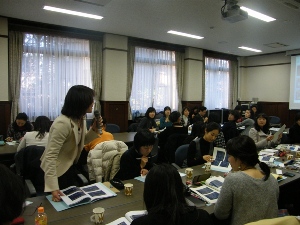
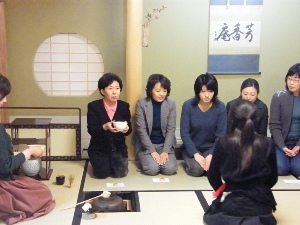
b]Date: December 14, 2008 (Sunday) [/b]
Venue: Ochanomizu University Science Building #3, classroom 701
Symposium 1:00 - 5:00 p.m.
Reception 5:15 – 6:00 p.m.
Sponsored by: Ochanomizu University Global COE Program
Simultaneous translation (English/Japanese)
Outline:
The focus is placed on educational achievement gaps in East Asia. In China, the Assessment Center for Basic Education, a subsidiary institution of the Ministry of Education, was established at Beijing Normal University in order to statistically analyze achievement gaps by conducting nationwide surveys. In South Korea, national achievement tests, once abolished, have been revived with the start of a new administration. This symposium brings together speakers from China, South Korea, and Japan to discuss current status and policy issues of educational achievement gaps in East Asian Countries.
Program
1:00-1:10
Opening: Greetings Professor MIMIZUKA, Hiroaki
1:10-1:50
China: DU, Yuhong (Professor, College of Education Administration, Beijing Normal University)
"Student Academic Performance and the Allocation of School Resources: Results from a Survey of Junior Secondary Schools in China"
1:50-2:30
Korea: KIM, Kyung-Keun (Professor, Department of Education, Korea University)
"Achievement Gaps in Secondary Education: The Korean Case "
2:30-3:10
Japan: NONOYAMA-TARUMI, Yuko (Assistant Professor, Ochanomizu University Global COE Program)
"Student Achievement Gap in Japan: Findings from PISA Data "
3:10-3:30 Break
3:30-4:00
Commentator
YAMANOUCHI, Kenshi (Associate Professor , Kobe University)
MIMIZUKA, Hiroaki (Professor, Ochanomizu University)
4:00-4:45
Discussion
4:45-5:00
Closing Remarks, Professor UCHIDA, Nobuko
5:15-
Reception (Science Bldg3, lounge)
Cocktail/tea/coffee and some snacks
Chair: HAMANO, Takashi (Associate Professor, Ochanomizu University)
Simultaneous translation (English/Japanese)
Admission Free
Contacts:
Ochanomizu University Global COE
TEL&FAX: 03-5978-5247
EVENT REPORT
The focus of the Second International Symposium “Educational Achievement Gaps in East Asian Countries: Current Status and Policy Issues” was placed on educational gaps in East Asian countries. It was our great honor to invite distinguished scholars from China and Korea with whom we discussed current status and backgrounds of educational gaps in China, Korea, and Japan.(14.Dec. 2008)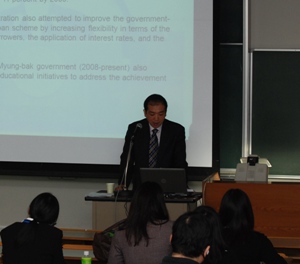
Date:
Friday, November 28th
15:00~17:00
Venue:
Ochanomizu University, Main Building, Room #135
Fee: Free
Registration: Not necessary (Please come to the venue directly)
The Global COE Program of Ochanomizu University will hold an international symposium on early childhood care and education in Mongolia. Dr. Batdelger Jamsrandorj, (Professor, Mongolian State University of Education) , Dr. Tsendsuren Tumee (ECD officer, UNICEF Mongolia), and Ariuntuya Myagmar (Ph.D candidate at Hitotsubashi University) will present the situations of early childhood care and education in Mongolia. We cordially invite you to participate in this symposium.
Presenters:
1. Preschool Education Reforms in Mongolia
Batdelger Jamsrandorj (Professor, Mongolian State University of Education)
2. Alternative Forms of Early Childhood Development Programs in Mongolia
Tsendsuren Tumee (ECD officer , UNICEF, Mongolia)
3.Ger-Kindergarten for Nomadic Children. From Field Survey
Ariuntuya Myagmar (Ph.D candidate at Hitotsubashi University)
Language:
Presentation will be made in English.
For discussion, Mongolia-Japanese Interpretation will be provided
Sponsor:
Ochanomizu University Global COE Program International Inequality Research Group
Contact:
Ochanomizu University Global COE Program Secretariat
TEL&FAX: 03-5978-5247
EVENT REPORT
The Global COE Program at Ochanomizu University held an international seminar on early childhood care and education in Mongolia. First, Dr. Batdelger Jamsrandorj, (Professor, Mongolian State University of Education) made a presentation on preschool education reforms in Mongolia. Next, Dr. Tsendsuren Tumee (ECD Officer, UNICEF, Mongolia) presented information on alternative forms of early childhood development Programs in Mongolia. Finally, Ms. Ariuntuya Myagmar (Ph.D. candidate at Hitotsubashi University) presented the situations of Ger-Kindergarten for Nomadic Children from a field survey. The participants led active discussions on the topic of kindergarten and primary schools in Japan and Mongolia.(28.Dec. 2008)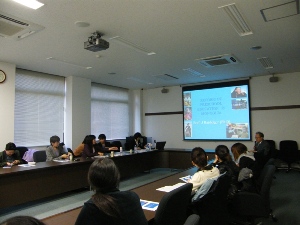
On November 18 (Tuesday), 2008, the Global COE Program of Ochanomizu University (Inequality in Childrearing) hosted an open seminar entitled “The General Aggression Model and the Escalating Cycle of Violence,” which was presented by Dr. Craig A. Anderson, a Distinguished Professor at Iowa University.
This seminar was tied into the regular open seminar “Media Violence and the Development of Aggressive Personality,” which was held earlier in the month as part of the 17th Annual Meeting of the Japanese Society of Personality Psychology (Nov. 15; Venue: Ochanomizu University; GCOE co-sponsor: JSPP). At the Nov. 18 Seminar, Prof. Anderson presented a detailed report on items including the results of experiments related to the escalating cycle of violence, based on the General Aggression Model.
Prof. Shintaro Yukawa (Tsukuba University), the designated debater for the session, offered many interesting comments and questions, which helped the participants gain a deeper understanding of the issue. The participants, who included many researchers and students from both inside and outside Ochanomizu University, listened intently to the latest report from one of the world’s top experts in research on aggression, and actively took part in the Q&A and exchange of opinions.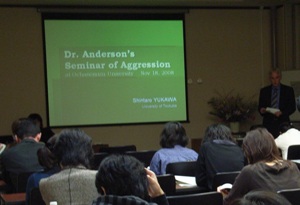
On November 15 (Saturday), 2008, the Global COE Program of Ochanomizu University (Inequality in Childrearing), in collaboration with the Japanese Society of Personality Psychology (JSPP), hosted a seminar entitled “Media Violence and the Development of Aggressive Personality,” which was presented by invited lecturer Craig A. Anderson, a Distinguished Professor at Iowa University.
Prof. Anderson is considered one of the world’s leading experts in research on violence in the media. The seminar was planned as a regular open seminar at the 17th Annual Meeting of the Japanese Society of Personality Psychology (Nov. 15-16, 2008; Venue: Ochanomizu University).
The central theme of the seminar was the effects of repeated contact with media violence on aggressive behaviors and aggressive personalities, but Prof. Anderson also provided a detailed report on the “General Aggression Model” that he and his colleagues have proposed. Along with the model, which offers an integrated explanation of past research regarding the effects of media violence on aggressiveness, Prof. Anderson presented a wide range of interesting and important data.
Prof. Akira Sakamoto, who acted as Chair for the seminar, offered comments in response to Prof. Anderson’s report based on his own surveys and research, and other participants actively asked questions in what proved to be an extremely valuable discussion.
The Global COE Program at Ochanomizu University held a seminar on international education development. First, Professor Hamano, a leader of the international inequality research group, made a presentation on global trends in educational development and challenges in international cooperation. Next, Dr. Takita presented information on the current situation and policy challenges for EFA in Laos. Dr. Araki then spoke about her research and experiences in Tanzania, and Dr. Tarumi commented from the viewpoint of international and comparative education studies. After that, the participants had an active discussion on these issues.(14. Nov. 2008)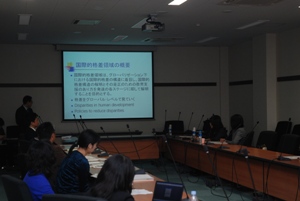
The Global COE Program at Ochanomizu University (Educational/Social Inequality Research Group) held a public seminar on the Japan Education Longitudinal Study (hereafter JELS). JELS is the first full-scale longitudinal study in Japan, which covers childhood to adulthood. We examined various patterns of children’s development and interactions among family and in school education. The research team reported their findings at JELS2003/2006. 